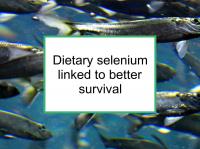Selenium is an essential element with numerous roles in maintaining good health, but high levels are toxic. Adequate levels of selenium have been shown to protect against cancer development, including breast cancer, but high levels do not appear to reduce risk. Selenium has been shown to increase the effectiveness of some treatments.
This includes the chemotherapy drugs doxorubicin and paclitaxel, as well as the anti-estrogen drug tamoxifen. Now a new study has reported that high dietary levels of selenium are associated with improved survival in women with breast cancer.
Food sources of selenium
The amount of selenium in plant food is dependent on the amount in the soil, which varies by region. Brazil nuts are by far the richest dietary source of selenium. One Brazil nut provides 100 to 300 mcg of selenium. The following foods are sources of selenium in the diet while also protecting against breast cancer:
Black pepper has been found to increase the bioavailability of selenium in the diet. Selenium is also accumulated in cruciferous vegetables such as broccoli and kale if grown in selenium-rich soil. The form of selenium found in plants has been shown to be more effective in the inhibition of rodent mammary tumors than the form found in cereals and grains.
Relatively high levels of selenium are also found in some foods that are not on our recommended list because there is not enough data to determine their impact on breast cancer risk. These include tuna, halibut, cod and other white fish, sunflower seed kernels, pistachio nuts, hazelnuts, almonds and other nuts, bread, egg noodles and other pasta, rye and oatmeal. Selenium is also found in the some foods on our avoid list, including red meat, liver, and shellfish.
Latest research finds dietary selenium improves survival
The prospective study referenced at the beginning of this news article was designed to investigate whether dietary selenium is associated with breast cancer survival. The study included 3,146 women with invasive breast cancer in Swedish Mammography Cohort. A food frequency questionnaire completed in 1987 was used to assess selenium intake before the diagnosis of breast cancer. The women were followed through 2009, during which time there were 416 breast cancer-specific deaths and 964 deaths from all causes (including breast cancer).
Dietary selenium intake was found to be positively associated with breast cancer-specific survival and overall survival. The women were divided into four groups based on their selenium intake. Women with the highest level of selenium consumption had a 31% lower risk of death from breast cancer compared to those with the lowest level.
The inverse association between dietary selenium intake and breast cancer death appeared strongest among women who had ever smoked (possibly because selenium counteracts the toxic effects of cadmium in cigarette smoke). The authors conclude that dietary selenium intake before a diagnosis of breast cancer may improve both breast cancer-specific survival and overall survival. However, the authors note, these results may be limited to populations with low intakes of selenium.
Bottom line for breast cancer survivors
The message we take from this study and others concerning selenium is that selenium-rich foods are beneficial for breast cancer survivors. However, women should avoid overconsuming Brazil nuts - an average of one nut per day would be a reasonable intake. Generally speaking, selenium supplements are neither necessary nor advisable.
